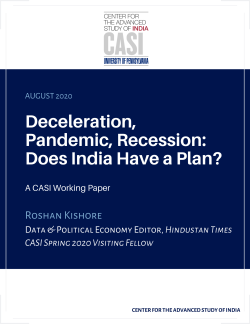No New NDA

Earlier this summer, India Review published a special issue addressing the implications of the 2019 general election for India’s democratic polity. Milan Vaishnav and I edited the essays.
Manikpur Railway Junction: The Geography of Uneven Development

In May 2020, two months after the Indian government imposed a nation-wide lockdown in response to the coronavirus pandemic, workers on the verge of starvation set out on foot, in the millions, to return to the relative sanctuary of their villages thousands of kilometers away. Having relied on the railways to bring them from their villages to cities, these workers often followed the familiar rail tracks back to their village destinations. On May 8, near Aurangabad, sixteen migrants lay down on rail tracks to sleep, and were run over by a freight train.
Sachin Pilot
Challenges Facing Electoral Democracy in India: A Politician’s View
December 7, 2016, University of Pennsylvania
Dr. K. Srinath Reddy
Will India's New Health Policy Improve Effectiveness and Equity?
A CASI Nand & Jeet Khemka Distinguished Lecture - April 11, 2017, University of Pennsylvania
What Does India Need to Do to Clean Up its Air?

In 2018, India had 22 of the world’s 30 most air-polluted cities. Household sources of ambient air pollution, such as cooking and heating, are the single largest contributor in much of the developing world, including India. Air pollution levels within households that cook with solid fuels, such as wood and cow dung, can be high and skyrocket to 40 times greater than the safe limit prescribed by the WHO.
Time to Invest in Building MSME Lending Infrastructure in India

The COVID-19 crisis and the consequent lockdown have posed especially tough challenges for micro, small, and medium enterprises (MSMEs) in India, stemming from their limited financial resources. As a result, the Indian Government has announced several measures to help the country’s 63.4 million MSMEs due to their important place in the Indian economy—employing 110 million people and accounting for 29 percent of GDP. The largest initiative announced was the provision of Rs.
Naveen Bharathi
Naveen Bharathi is an Assistant Professor of Public Policy at Indian Institute of Technology Bombay, a CASI Non-Resident Scholar, and was a CASI Postdoctoral Research Fellow from 2020-22. His research interests lie at the intersection of political sociology and political economy of identity in India. Specifically, his research explores the relationship between ethnic diversity and development, most broadly conceived. He has written about issues ranging from the relationship between ethnic diversity and public goods provisioning to spatial segregation in contemporary urban India.
Tariq Thachil
Tariq Thachil served as Director of CASI from July 1, 2020 to June 30, 2025. He is a Professor of Political Science at Penn and the Madan Lal Sobti Professor for the Study of Contemporary India.

